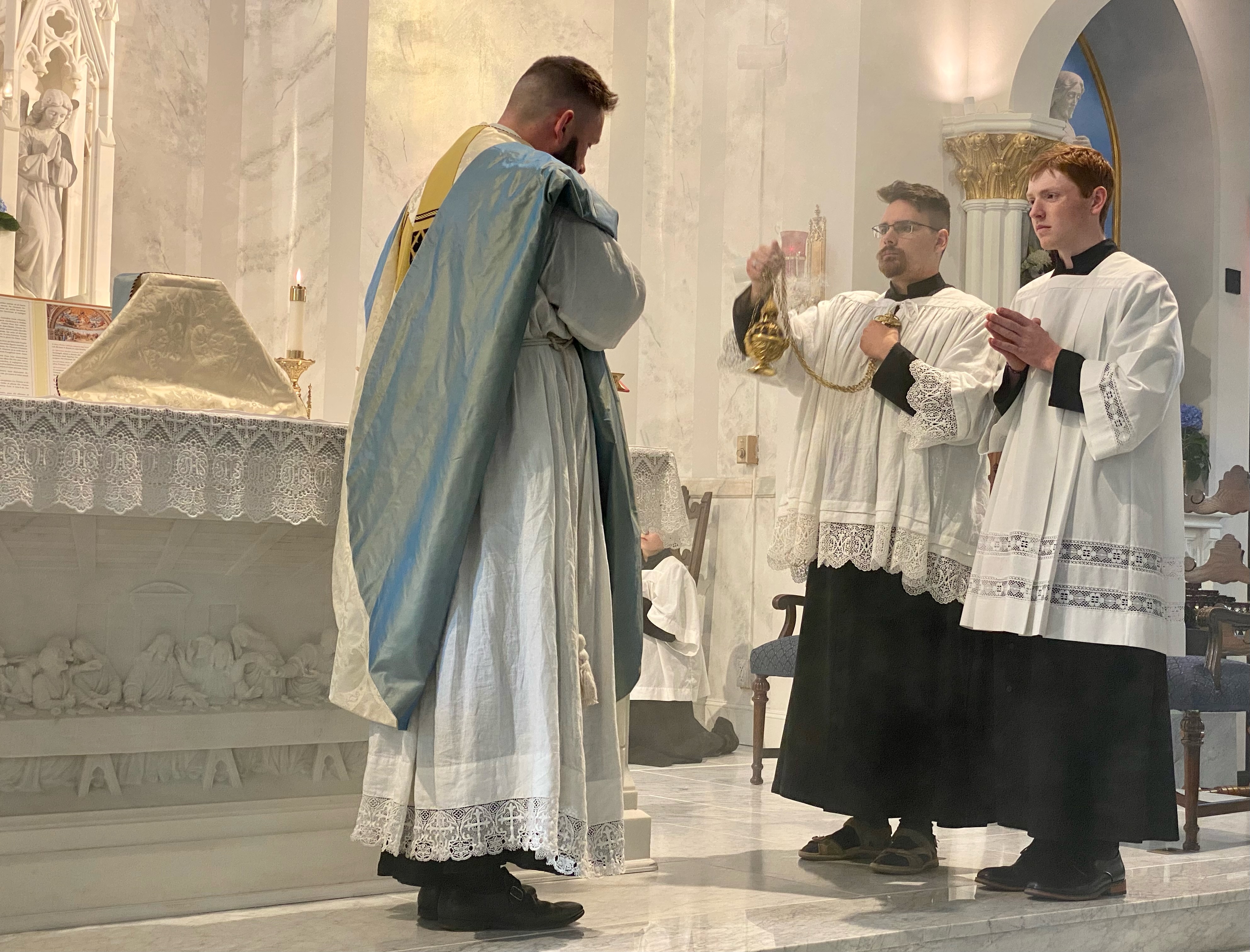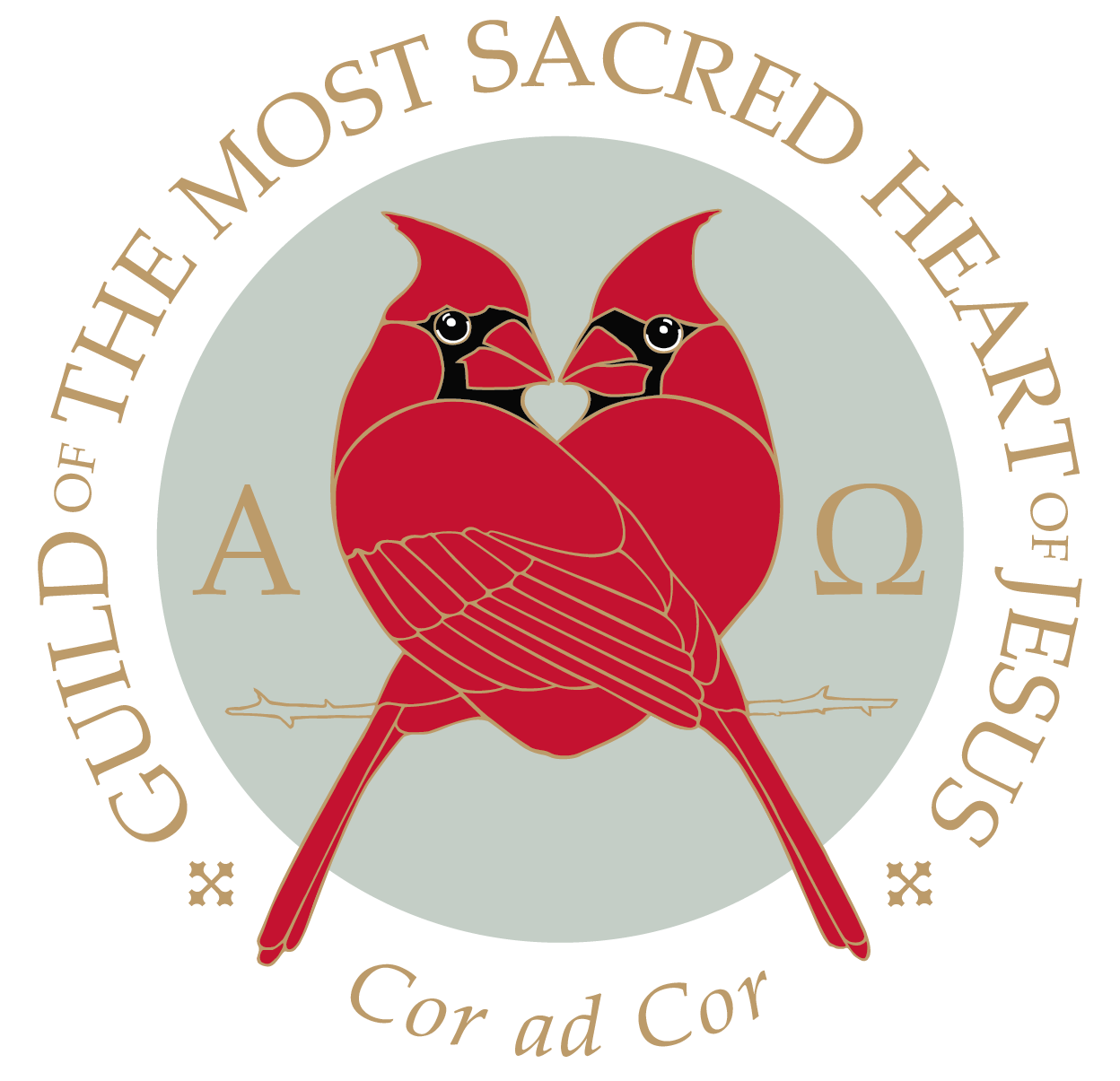
|
It is a particular personal pleasure to be celebrating Holy Mass with you in this church. And it is a real delight to be able to welcome new friends as well as old into a church which can actually fit us all in. What a delight and a luxury we have of space this evening. But it is a personal delight for me for reasons which I have never had the opportunity to share with the community here at St. Mary’s in Ridgefield. I am a priest of the Diocese of Bridgeport because of this parish and because of its community. I came to the Diocese of Bridgeport as a holiday maker, on a simple vacation to visit a dear friend who happened to be at residence in this parish, just for the summer. My experience here was nothing like a vacation at all.
The pastor (at the time) was away while I was visiting Ridgefield. I never was able to meet him that summer, but since then he has become a good friend of mine. My other priest friend who invited me had been assigned here more than 20 years ago and was well-known to the community here in Ridgefield. That summer was something of a homecoming for him. He was very busy with the regular and ordinary ways of the parish, and this touched my heart in a way that I was not expecting. This touched my heart in such a profound way that I could not get the people of this parish out of my very soul when I returned to Rome to resume my studies.
As a consequence of that experience of the love of Christ possible in this community, I stand before you having moved 5,000 miles across the sea in order to serve you. So for me, too, this is a homecoming; the first opportunity I have had to share that story in the place in which it happened.
But that is just a personal aside. Much more important is the Gospel we have today. It is so important that because it is the Sunday Gospel, we have the opportunity to reflect upon it for the entire week. There are no Saints’ days that interrupt the liturgical flow, therefore, we have the beautiful privilege to ponder for seven days this particular Gospel passage from the 20th Chapter of John, the post-Resurrection appearances of Our Blessed Lord to the Apostles.
There are so many angles that a preacher can choose with this particular Gospel, so many ways they open the door to that extraordinary experience of the resurrected Christ. So many details of how our Church works are revealed in this Scripture, that in our Resurrection joy, we may easily overlook. Here we have the kernel of the Institution of the Sacrament of Confession; the seed of that reconciliation that Christ wanted to give with His Easter peace.
So much the emphasis is on peace, the Lord says it twice. He breathes on the Apostles and says to them, “Receive the Holy Ghost. Whose sins you shall forgive, they are forgiven them. Whose sins you shall retain, they are retained.” We are familiar with those words, with the idea that we can access God’s forgiveness in the Sacraments of the Church ministered through His priests. But it is important to go deeper, to understand a little more clearly what is going on here. Our reconciliation, that great Sacrament, is not just a private concern between me and God, or you and God. It also has a public dimension, an ecclesial dimension. It does not just involve you and God, it involves you and God and the Church. We can see that by the way in which the Sacrament was instituted.
As you read this Gospel passage, the first question to ask yourself is: “to whom is this power addressed? Who was the recipient of this extraordinary ability to forgive sins in the name of God?” (Remember that forgiving sins is part of the prosecution case against Jesus made by the Jewish authorities. He must claim to be God, because He claims the power and ability to forgive sins. Only God can forgive sins, therefore in pure logic, He must be claiming to be God. And so He was.) Here in this passage, that power which is His by right is transferred by breath, by the motion of breathing, onto the recipients to whom it was designated, those to whom the Lord desired to exercise that ministry in His name.
Note the details: the doors were shut. That is to say, this is not a power given to everyone. It is a very specific power. It elicits peace. It can only happen in the context of peace. And it happens after the Lord has shown His wounds to those who are in the receipt of that power. He is showing his wounds to them. The power to forgive sins comes directly from the wounds of Christ, shown to those who will offer that forgiveness in His name. And He breathes on them the cooperation with the Holy Spirit, whose power it is amongst us that draws us to Christ in the first place, that draws us to seek His forgiveness.
This power is not given to the whole community. It is not a general power given in the Spirit to forgive each other’s sins. It is not given to all the disciples, either. Just being a follower of Jesus is not sufficient. It is not given to everyone who would call himself a Christian, to everyone who would call himself a disciple of Our Lord. And the evidence that the power is not given to everyone is that it is not given to Our Lady. Our Lady, the highest honor of our race, God’s best idea, does not have the power to forgive sins in His name. It is a very specific power given and to be exercised in an ordered way, not in a disordered way.
It is given in a way in which involves the Church as a visible community, not as an idea that does not really exist anymore. This power is given to bishops. Reconciliation, every act of reconciliation, involves the bishop. It involves your local successor to the Apostles intimately. It is an exercise of two of the three munera that he has of governing and sanctifying. Every confession is an exercise, then, of the bishop’s jurisdiction over all the souls baptized, indeed all souls, that reside in Fairfield County. No other priest has that authority. It resides by right in our diocesan bishop and in Him alone.
By extension, that power is shared amongst his coworkers, the priests, and why? On what basis does the bishop share this extraordinary power even when the doors are shut? He shares this power on the basis of obedience. His coworker is the one who has pledged to obey by putting his hands between those of the bishop on the day of his Ordination. That is a sacred and public promise. Therefore, the power given to the Church to forgive sins is one which is exercised never apart from the power and jurisdiction of the bishop. That extension for priests, by the way, is an example of how the Holy Spirit operates in the Church. Only because of the experience of the Irish monks was Reconciliation available on a private basis through auricular confession.
Beforehand, before that part of the Sacrament was unlocked in the Church’s experience, it involved the bishop, personally. Can you imagine? Whenever you needed to go to Confession, you would have to go to the bishop personally and ask him permission for you to be admitted into the Order of Penitence. That was the first way in which they would exercise this power given by Christ when the doors were shut, to forgive sins or to retain them. But over the centuries, we have seen that God desires to be even more merciful. The power is given carefully and in a controlled way to the priests who have pledged a promise of obedience to that bishop.
This power, then, is strictly hedged in by two gateposts that we do not talk about very often but are very, very important. The first is: Canonical Mission, the second: Faculties. What is Canonical Mission? If we are called, as we are, to spread the Gospel, we are called to do it in an orderly way, not in a disorderly way. I cannot decide on my own to go to Japan and start preaching, just because I happen to be a priest. If I go to Japan, I would be going into the diocese of a Japanese bishop. And if I want to operate in the diocese of a Japanese bishop, I need the permission of that Japanese bishop in order to do so. That is orderly, and that is visible. The Church is not disorderly.
The second way that the power is hedged in is through Faculties: the specific power given to me, personally, by a bishop, personally, to exercise that power in the name of Christ, and also through the power of the bishop.
Canonical Mission is a broader concept even then that. It does not just relate to the exercise of hearing Confessions. Canonical Mission is, in layman’s terms, ‘staying in your lane.’ What are you set aside to do in the Church? If you are a Carthusian monk, you are not called to preach the Gospel on the highways and byways. Your Canonical Mission is to be contemplative. If you go outside the bounds of your Canonical Mission, you are doing so against the vows that you have promised before God, and you will be judged upon the vows that you have made.
Similarly, all others who have a specific vocation within the Catholic Church need to be aware of what their Canonical Mission is. A priest like me who is ordained into a presbyterate that is readily identifiable, such as the Church of Bridgeport, has a Canonical Mission to all souls in that territory and not the souls in Litchfield County or Putnam County or any other county. My Canonical Mission does not extend directly to those people in other areas. It is here. It is for you. I did not expect to be drawn to this diocese. I did not even know where it was. And yet this is where God has placed me.
We grow well where God desires us to be planted. Canonical Mission is an extremely important concept. We cannot ‘go it alone.’ Those who ‘go it alone’ end up out of communion with the Church, even if their motivation for ‘going it alone’ was understandable. Nevertheless, they run the risk of falling out of communion with the Church of Christ almost by accident. And we must be very careful to prevent that from happening.
In this Eastertide, let us not just focus on the glory of the Lord’s Resurrection, but focus on the Church which was established to proclaim that glorious Resurrection until He comes again. We are in the time between Easter and Pentecost. In Pentecost, we celebrate the fullness of that Canonical Mission being granted to the Church and the Apostles with the descent of the Holy Spirit, definitively and irrevocably. In this season, it behooves us to consider the Church and our place and our role in it. And may God protect you always.
PRAY
